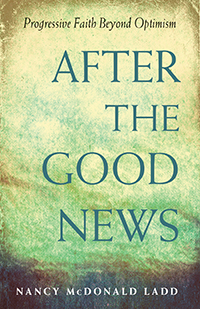
I recently had the privilege (and good fortune) of being asked to read and review the Rev. Nancy McDonald Ladd’s new book, After the Good News: progressive faith beyond optimism (Skinner House Books). I was going to read it anyway — Nancy is one of my favorite Unitarian Universalist writers — so I was excited to know even before I’d even started I had already been asked for my opinion!
After the Good News is easily one of the most important books I’ve read in a long time – it should be required reading for every religious professional (ordained or otherwise) who is serving a faith community that considers itself liberal or progressive, as well as each and every member. In fact, after reading just her Introduction I found myself seeing the liberal tradition I serve with new eyes, and challenged to change because of it.
With her usual self-depreciating humor, solid scholarship, and a willingness to prophetically challenge people she so clearly loves (among whom she explicitly includes herself), Nancy lays out the roots and present ramifications of the,
“oft-unacknowledged arc of history that doesn’t seem quite so triumphant; a narrative of the liberal church that stands counter to the rampart-holding optimism we proclaim in our most stirring hymns.”
In cogent and lucid prose she makes sense of the confounding resistance to efforts for real change experienced even among congregations that are calling for it. She makes clear why it is so difficult for so many people in liberal and progressive faith communities to recognize and acknowledge ourselves (particularly those of us who identify or are identified as white) as participating in and perpetuating the very systems and structures of white supremacy we are so committed to ending (even if unconsciously and unwittingly). In fact, she explains that it is our very enthusiastic optimism and faith in the vision of “Beloved Community,” important as it is, that can make us oblivious to the luxury, the privilege we have to keep ourselves at a distance from the reality of the suffering oppression has caused historically and causes still.
Yet After the Good News does not simply convict liberal and progressive religious traditions for their inability to recognize their own complicity in maintaining the injustices we would end. It also provides a pathway by which these traditions can evolve beyond their past in order to live more fully into the vision of Beloved Community we espouse.
“If liberal religion is to step into a future of engaged, anti-oppressive work,” she writes, “we will be called to serve not only because others are broken or the system is broken, but because, as Bryan Stevenson says, ‘I am broken too.’”
The empowering and inspiring vision is important, yet Nancy calls us to move beyond our ingrained optimism and to recognize the work of liberation as not just for those who have been marginalized by society, but for us all. As the Indigenous Australian academic, artist, and activist Lilla Watson has written,
“If you have come to help me, you are wasting your time. But if you have come because your liberation is tied up with mine, then let us work together.”To do this will be hard, painful, and disorienting, and Nancy is clear about how challenging this transformation will be. Ultimately, though, she is hopeful because of her faith in, and very obvious love of, the people who make up these liberal/progressive traditions. After the Good New delivers a prophetic message that will be extremely difficult for some to receive, yet which is fundamentally a message of hope. After reading it, my hope is renewed and deepened as well.
After the Good News: Progressive Faith Beyond Optimism is available from inSpirit (the UUA’s bookstore), as well as through Amazon (as both a paperback and an ebook), BarnesandNoble.com, and GooglePlay.
Pax tecum,
RevWik
